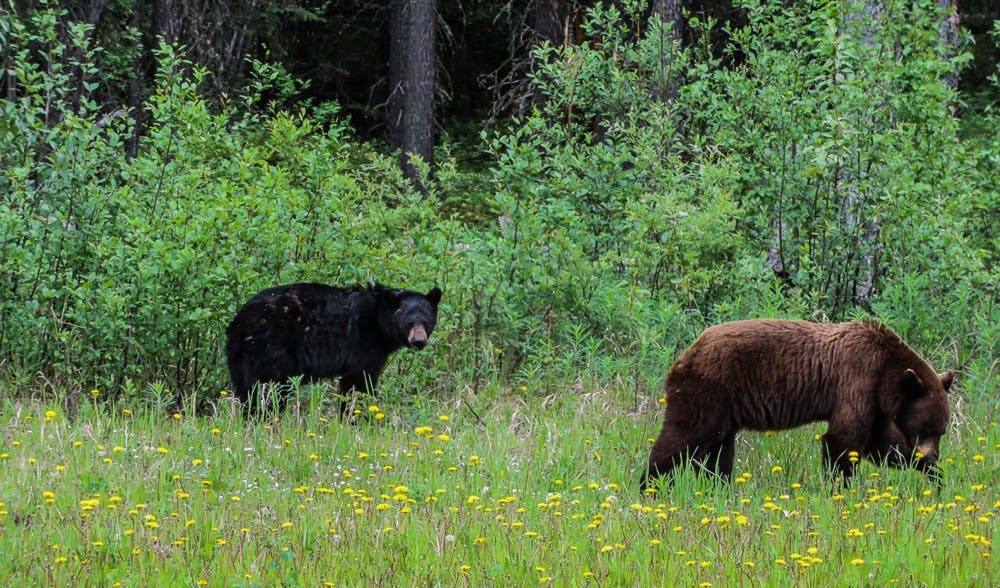
Ricki the bear was moved to a sanctuary in Colorado where she enjoys a much more natural environment, and where she can forage and roam freely.
Credit: Courtesy of Susan Drury/Creative CommonsFor Ursula Bechert, it’s important to speak up for victims of abuse — especially those who can’t speak for themselves.
For 18 years, Ricki the bear lived on display outside Jimmy Mack’s ice cream shop in York, PA. Last year, concerned local residents filed a lawsuit against the ice cream shop’s owner James McDaniel Jr., claiming that the bear’s treatment — her care, feeding and habitat — was a public nuisance. The Animal Legal Defense Fund, a non-profit law organization that aims to protect animal rights, spearheaded the lawsuit on behalf of York locals.
About a year ago, the ALDF contacted Ursula Bechert, a trained veterinarian and the Director of Degree Programs for Liberal and Professional Studies at Penn, and asked her to observe and comment on Ricki’s condition. Bechert informed the ALDF that in Ricki’s current conditions, “a slow and torturous decline in physical and mental health is inevitable for this bear.”
Ricki’s small cage had concrete flooring and a chain-link fence. The bear was fed by customers who paid 25 cents to release dog food into the cage through a PVC pipe. Ricki’s coat was dull and scruffy, and she walked with a slight limp. The bear also exhibited clear signs of anxiety, such as pacing. The ALDF used Bechert’s report to bolster their case.
York residents used online and social media platforms to raise awareness of Ricki’s condition and put pressure on Jimmy Mack’s owner to release her. The ALDF sponsored an online pledge to boycott Jimmy Mack’s ice cream shop until McDaniel consented to release Ricki.
“I think [the owner] was just trying to draw people to his ice cream shop by displaying different animals,” Bechert said. “He thought that having the bear was more positive than negative.” Ricki was one of several animals in McDaniel’s menagerie, which also included a peacock and a llama. In 2011, McDaniel denied that Ricki was being mistreated.
Since taking on the case, the ALDF has adopted a multi-pronged approach. It first brought a lawsuit against McDaniel. Now the ALDF is trying to improve the guidelines for captive bear maintenance and transportation.
Despite 18 years of abuse, there is a happy ending for Ricki. Last month, she was moved to a sanctuary in Colorado where she enjoys a much more natural environment, and where she can forage and roam freely.
“Even though she spent so much of her life [in a cage], it’s never too late,” Bechert said.
According to Bechert, Ricki’s mistreatment was not an isolated incident: Ricki’s case brings up the larger issue of animal abuse and public awareness. A similar case of bear mistreatment occurred recently at a roadside zoo in North Carolina.
“This is an example of how citizens can make a difference,” Bechert said, though she added that the process took a long time.
Bechert believes the debate over animal advocacy is polarized between those who oppose blatant animal abuse and those who oppose any type of scientific research involving animals.
“You can have people advocate for animals in a very extreme sense, and I think a lot of people associate PETA with that. Scientists can be doing research with animals that’ll actually be helpful to the animals, not just people, and yet some animal rights activists will try to shut the project down,” Bechert said. “Animal advocacy is not black and white; there are a lot of gray areas.”
There are many simple ways in which Penn students can become involved in animal advocacy, Bechert added. She encourages students to volunteer at or fundraise for local animal shelters, which often struggle financially to maintain the animals they house.
Students can also help educate the public on animal welfare issues, such as the value of spaying and neutering their pets. Finally, Bechert urges the Penn community to keep an eye out for animals that might be suffering from abuse and intervene if they see anything.
“If you see somebody who is torturing animal, that’s really bad not just for the animal, but I think it says something about that person,” Bechert said. “If someone is abusing an animal, they’re probably very close to abusing a person.”
The Daily Pennsylvanian is an independent, student-run newspaper. Please consider making a donation to support the coverage that shapes the University. Your generosity ensures a future of strong journalism at Penn.
DonatePlease note All comments are eligible for publication in The Daily Pennsylvanian.







